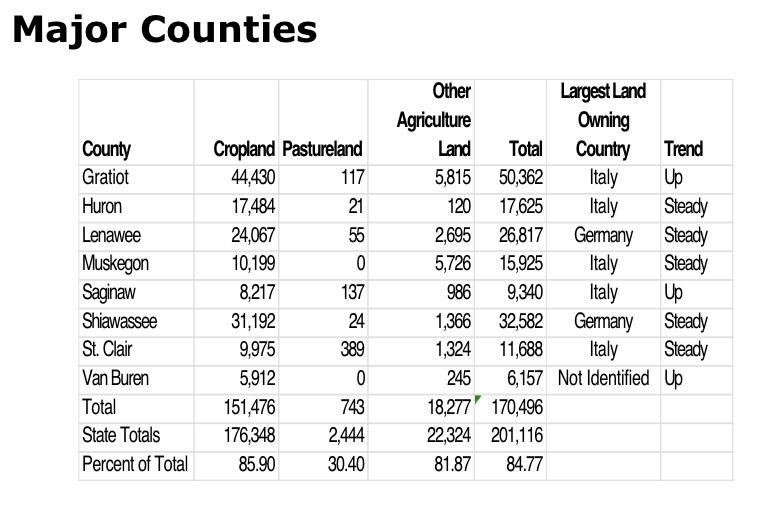
Graphic of foreign-held acreage in Michigan by county. Credit: Michigan State University
By Kelsey Lester
The recent expansion of China-owned land in the U.S. is raising concerns about the food supply chain and affordable land in Michigan.
Within the past year, there have been escalating conflicts between the U.S. and China on a range of policy issues, and that has led to proposals to block some real estate investments by China-based companies.
Most of the U.S. property that Chinese companies own and are buying is agricultural land. According to the U.S. Department of Agriculture, or USDA, that ranges from forestland to pastoral land to farmland.
Farmlands are usually attractive to foreign investors because the properties appreciate in value over time and generate income.
William Knudson, an agricultural economist at Michigan State University and a previous agricultural policy adviser for the Senate Majority Policy Office, said that the ownership of Michigan farmland by China is “awfully close to none.”
“If I was worried about foreign ownership of the food supply I would not focus on land,” he said. “I’m focused on things like owning seed companies, major grain shippers and handlers because that’s where the choke points are in the agri-food supply chain.”
“So you know, you’re not going to control the food supply through land purchases. It’s just too expensive to buy enough land to do that,” Knudson said.
Some lawmakers argue otherwise.
A bill by Reps. Tom Kunse, R-Clare, and Matt Hall, R-Richland, would prohibit “certain foreign ownership of certain real estate.” This would make the purchase of farmland by Chinese entities more difficult.
The restrictions would apply to “adversarial entities,” a term that refers only to the People’s Republic of China, the Chinese Communist Party, their governmental entities and “any person that has sworn an oath of loyalty to the People’s Republic of China or the Chinese Communist Party.”
“The Chinese Communist Party is constantly plotting to spy on the United States and expand its sinister influence in our country,” said Kunse.
“China has bought up hundreds of thousands of acres of land to gain greater access to our nation. We know China will do whatever it takes to get a foot in the door, and we must treat our adversary with the seriousness demanded by these hostile intentions,” he said
Chinese companies own around 380,000 acres of agricultural land in the country, which is less than 1% of total foreign-owned farm property, according to the USDA
Supporters of the proposal cite concerns about food and national security.
But Knudson said, “Part of the suspicion is ‘should we let China control the food supply? You’re not in control of the food supply by just buying farmland — there’s just too much of it out there.”
Another concern for farmers is the rising price of land. Some are worried that affordable land won’t be possible for young and beginning farmers if they are “priced out” by foreign companies, he said.
Some states have laws that restrict foreign ownership of agricultural land. Arkansas is one of those states and is now ordering a Chinese-owned company to divest itself of 160 acres.
According to the USDA’s latest annual report, foreign investors had an interest in around 40 million acres of agricultural land in 2021 — about the size of Wisconsin. That represents 3.1% of all private forest and farmland in the country, and is a 2.4 million acre increase from 2020.
Counties with large amounts of foreign-held agricultural lands are Gratiot, Huron, Lenawee, Muskegon and Saginaw, according to data from MSU.
Michigan has about 1.4 million acres of foreign-held agricultural land, according to the USDA. In proportion to the size of the states, Michigan is No. 6 in the amount of foreign-held farm and forest land. Italy and Germany entities account for most of that land.
In the Midwest, Chinese entities own around 44,000 acres, which is about an eighth of such entity property holdings in the United States, according to the USDA.
“The short answer is foreign ownership of agricultural land is increasing, but from a very low level,” Knudson said.
The bill is pending in the House Government Operations Committee.
Kelsey Lester reports for Capital News Service